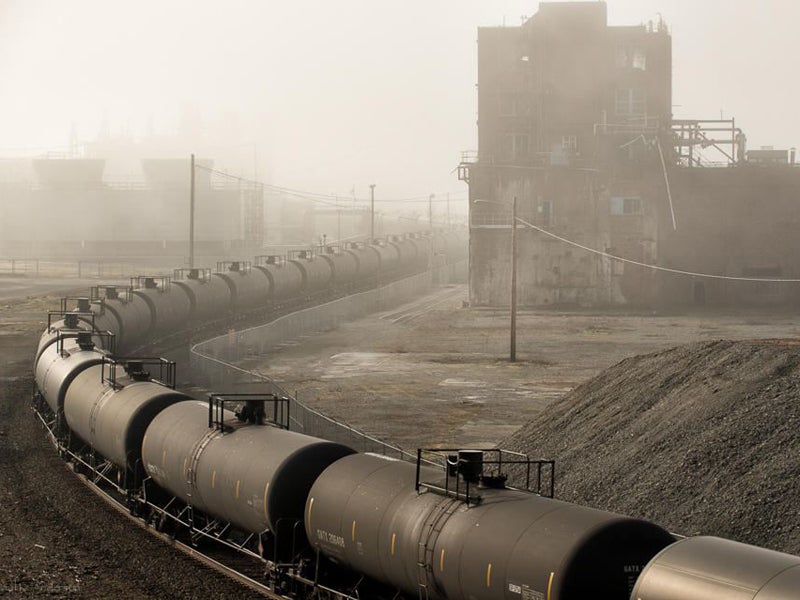California Judge Keeps Rail Companies on the Line for Oil Spill Disasters
A state judge has dismissed the railroad industry’s case against safety rules for crude-by-rail shipments.

This page was published 10 years ago. Find the latest on Earthjustice’s work.
Late last week, emergency crews in Culbertson, Montana rushed to raise 22 toppled tanker cars, right a felled power line and contain 35,000 gallons of spilled oil. In an all-too-familiar scene, 106 rail cars loaded with explosive crude oil from the Bakken region of North Dakota were hurtling toward a West Coast refinery when they were thrown from the tracks like a child’s toy train set. No fires or injuries were tied to the wreck, but the Associated Press reports that trains carrying Bakken oil have been involved in fiery derailments in six U.S. states, as well as a 2013 explosion that killed 47 people and nearly wiped the Canadian town of Lac-Megantic off the map. California is determined not to be next.
As crude oil streams from the fracked wells of North Dakota and the tar sands of Alberta, more and more of it is shipped to refineries by rail. According to the California Energy Commission, crude-by-rail shipments increased from 45,000 barrels in 2009 to six million barrels in 2013, a 135-fold increase in four years. Last year, California officials passed a law that expands the state’s oil spill prevention and planning regulations to cover inland spills from rail cars. The law requires railroad companies to create comprehensive oil spill response plans and show they have the funds to clean up a major spill along their shipping routes through the state. The railroad industry sued, arguing that state oil spill regulations can’t be applied to railroads because federal rail laws, which do not have the same requirements, supersede any state rules.
Earthjustice, representing a coalition of groups from the SF Baykeeper to the California Sportfishing Protection Alliance, added our amicus brief to the state of California’s defense of the law. In a ruling in late June, Judge Troy Nunley delivered a victory by dismissing the railroads’ case. Nunley argued the industry was too quick to cry foul, since the law they challenged has yet to be implemented.
“California’s law is a sensible response to the flood of Bakken crude and Canadian tar sands oil entering the state by rail, and the court has done the right thing by dismissing railroads’ challenge,” said Earthjustice attorney Tamara Zakim. “States have the authority—a duty even—to demand basic accountability, including financial and logistical preparedness, from railroads in light of the alarming risks to California’s public safety and environmental health posed by crude-by-rail activities.”
The California law may be more vital than ever, as crude-by-rail shipments in the state continue to surge. In 2014, California imported an average of 500,000 barrels of oil per month by train. A report by the Natural Resources Defense Council shows that two million Californians in the San Joaquin Valley and the San Francisco Bay Area live within a half mile of a current or proposed crude-by-rail route. A half mile is the official federal evacuation zone for crude oil train accidents.
One proposed project by the Phillips 66 oil company would move up to five trains per week carrying 80 tanker cars each along Amtrak passenger lines in the Bay Area. An analysis of the plan by Hinman Consulting Engineers found a 28 percent risk of derailment in one of the most highly populated Bay Area cities in the next 30 years, even assuming there is no increase in crude oil shipping. The engineers estimated that a single rail accident in the Bay Area could destroy 117 households and $244 million in property value. Communities from San Jose to Los Angeles are lining up against the proposal.
To protect the public from the enormous risk of oil train wrecks, Hinman and the Natural Resources Defense Council recommend safety precautions like reducing train speeds, routing around densely populated and environmentally sensitive areas, providing more resources and training for first responders and building spill and fire barriers. Yet recently enacted federal laws designed to address crude-by-rail safety concerns fall far short of what’s needed to protect the public. In the absence of stronger federal rules, it’s imperative that state laws make oil train operators responsible for the pollution and property damage they cause.
Learn more about crude oil rail shipments and accidents accross the U.S. in our Map Feature: Crude-by-Rail Accross America.